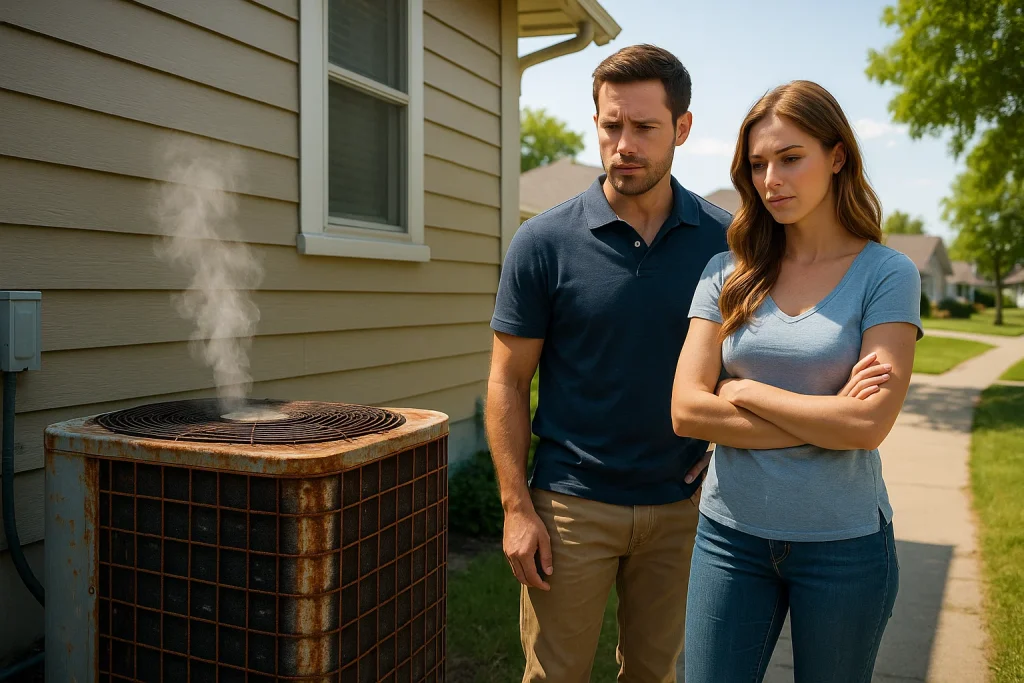Your air conditioner is essential for keeping your home comfortable, especially during hot summer months. But like any major appliance, it won’t last forever. Eventually, even the best-maintained AC systems wear out and need replacement. Knowing when it’s time to say goodbye to your aging air conditioner can save you money, improve comfort, and boost energy efficiency.

Signs It’s Time for a New Air Conditioner
1. Age of Your AC Unit
Most air conditioners have a lifespan of 10 to 15 years. If your system is approaching this age or older, it’s likely less efficient and more prone to breakdowns. Older units use outdated technology and refrigerants that are no longer environmentally friendly.
2. Frequent Repairs
If your AC has required multiple repairs recently or the cost of a single repair approaches half the price of a new system, replacement is often the smarter choice. Frequent repairs not only add up financially but also mean your system is unreliable.
3. Rising Energy Bills
Older air conditioners consume more energy to deliver the same cooling. If you notice your utility bills steadily increasing despite normal usage, your AC might be losing efficiency. Replacing it with a modern high-efficiency unit can lower your monthly costs.
4. Inconsistent Cooling or Poor Comfort
Does your home have hot spots or rooms that never seem to get cool? If your AC struggles to maintain consistent temperatures or runs constantly without reaching the thermostat setting, it may be undersized or failing.
5. Strange Noises or Odors
Rattling, buzzing, or grinding sounds indicate mechanical problems, while musty or burning smells can signal mold growth or electrical issues. These are warning signs that repair may no longer be enough.
The Benefits of Upgrading to a High-Efficiency HVAC System
If it’s time to replace your AC, consider investing in a high-efficiency system with excellent SEER2 and AFUE ratings. Here’s why:
- Energy savings – High SEER2 (Seasonal Energy Efficiency Ratio) ratings mean the system uses less electricity to cool your home, lowering your utility bills significantly. High AFUE (Annual Fuel Utilization Efficiency) ratings for furnaces mean more heat is produced from each unit of fuel, improving heating efficiency.
- Improved Comfort – New systems often include advanced features like variable-speed compressors, smart thermostats, and better humidity control, enhancing your home’s comfort year-round.
- Reliability and Warranty – High-efficiency HVAC systems often come with longer warranties and improved reliability, providing peace of mind.
Long-Term Savings Outweigh Initial Costs
While the upfront investment for a new high-efficiency AC system can be significant, the long-term savings on energy bills and repairs make it worthwhile. A newer unit will operate more efficiently, cost less to run, and reduce maintenance expenses. Plus, many utility companies and manufacturers offer rebates or financing options that make upgrading easier and more affordable.
Additional tips for choosing the right replacement system:
- Proper sizing – An HVAC professional can perform a load calculation to ensure the new system is sized correctly for your home’s square footage, insulation, and layout.
- Professional installation – Expert installation is critical to maximize efficiency, reliability, and longevity.
- Consider a heat pump: If you live in a moderate climate, a heat pump can provide both cooling and heating efficiently.
Contact ThermAll Heating & Cooling, Inc: We are “Your Home Comfort Hero!”
